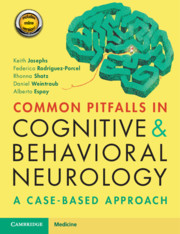Book contents
- Common Pitfalls in Cognitive and Behavioral Neurology
- Common Pitfalls in Cognitive and Behavioral Neurology
- Copyright page
- Dedication
- Contents
- Diseases Discussed in the Book
- Preface
- Acknowledgements
- Abbreviations
- Part 1 Missing the Diagnosis Altogether
- Case 1 It’s Just Old Age
- Case 2 Cognitive Decline Is Only Part of the Story
- Case 3 “I Keep Repeating Things to Him”
- Case 4 No Need to Worry: Your Neuropsychological Evaluation Was Normal
- Case 5 “Memory Is So Good She Will Never Get Dementia”
- Part 2 Misidentifying the Impaired Cognitive Domain
- Part 3 Missing Important Clues in the History
- Part 4 Failure of Pattern Recognition
- Part 5 Difficult-to-Characterize Cognitive/Behavioral Disorders
- Part 6 Clinical Findings That Are Subtle
- Part 7 Misinterpreting Test Results
- Part 8 Attributing Findings to a Known or Suspected Disorder
- Part 9 Missing Radiographic Clues
- Part 10 Management Misadventures
- Index
- Plate Section (PDF Only)
- References
Case 4 - No Need to Worry: Your Neuropsychological Evaluation Was Normal
from Part 1 - Missing the Diagnosis Altogether
Published online by Cambridge University Press: 03 November 2020
- Common Pitfalls in Cognitive and Behavioral Neurology
- Common Pitfalls in Cognitive and Behavioral Neurology
- Copyright page
- Dedication
- Contents
- Diseases Discussed in the Book
- Preface
- Acknowledgements
- Abbreviations
- Part 1 Missing the Diagnosis Altogether
- Case 1 It’s Just Old Age
- Case 2 Cognitive Decline Is Only Part of the Story
- Case 3 “I Keep Repeating Things to Him”
- Case 4 No Need to Worry: Your Neuropsychological Evaluation Was Normal
- Case 5 “Memory Is So Good She Will Never Get Dementia”
- Part 2 Misidentifying the Impaired Cognitive Domain
- Part 3 Missing Important Clues in the History
- Part 4 Failure of Pattern Recognition
- Part 5 Difficult-to-Characterize Cognitive/Behavioral Disorders
- Part 6 Clinical Findings That Are Subtle
- Part 7 Misinterpreting Test Results
- Part 8 Attributing Findings to a Known or Suspected Disorder
- Part 9 Missing Radiographic Clues
- Part 10 Management Misadventures
- Index
- Plate Section (PDF Only)
- References
Summary
Even when an accurate history and a comprehensive exam are obtained, putting the pieces together can be challenging. Here, we present cases of failures in pattern recognition.
- Type
- Chapter
- Information
- Common Pitfalls in Cognitive and Behavioral NeurologyA Case-Based Approach, pp. 9 - 11Publisher: Cambridge University PressPrint publication year: 2020



